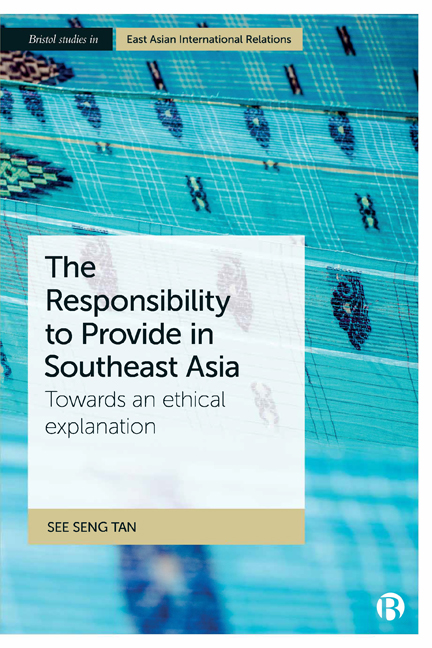Book contents
- Frontmatter
- Dedication
- Contents
- List of Tables
- List of Abbreviations
- Acknowledgements
- 1 Towards an Ethos of Responsibility in Southeast Asia
- 2 The Responsibility to Protect (R2P) and Responses from Southeast Asia
- 3 Towards a ‘Responsibility to Provide’ (R2Provide) in Southeast Asia
- 4 Institutionalizing Security Regionalism: Responsibility as ‘Response Ability’
- 5 Responsible Provision in HADR, Conflict Management and Human Rights
- 6 Towards the Responsible Management of Disputes in Southeast Asia
- 7 Communitarianism, Liberalism and the Limits of Responsibility in Southeast Asia
- 8 Levinas and the Responsibility to Provide in Southeast Asia
- 9 The Responsibility to Provide: Implications for the Region and Beyond
- Notes
- Bibliography
- Index
2 - The Responsibility to Protect (R2P) and Responses from Southeast Asia
Published online by Cambridge University Press: 02 March 2021
- Frontmatter
- Dedication
- Contents
- List of Tables
- List of Abbreviations
- Acknowledgements
- 1 Towards an Ethos of Responsibility in Southeast Asia
- 2 The Responsibility to Protect (R2P) and Responses from Southeast Asia
- 3 Towards a ‘Responsibility to Provide’ (R2Provide) in Southeast Asia
- 4 Institutionalizing Security Regionalism: Responsibility as ‘Response Ability’
- 5 Responsible Provision in HADR, Conflict Management and Human Rights
- 6 Towards the Responsible Management of Disputes in Southeast Asia
- 7 Communitarianism, Liberalism and the Limits of Responsibility in Southeast Asia
- 8 Levinas and the Responsibility to Provide in Southeast Asia
- 9 The Responsibility to Provide: Implications for the Region and Beyond
- Notes
- Bibliography
- Index
Summary
Introduction
The principle of ‘the responsibility to protect’ (R2P) is quite possibly the most important concept to be introduced in international relations in recent times. The aim of this chapter is to trace the emergence and evolution of this norm and to examine how it has fared in the context of Southeast Asia. The region's reactions to it can best be described as ambivalent. On the one hand, they accept for the most part of the notion that states bear certain responsibilities to protect their people from genocide, ethnic cleansing and other crimes against humanity, and should seek international assistance and enhance their capacities to implement those responsibilities. On the other hand, they have expressed reservations over the supposition that unilateral decisive action – including military action – can and should be employed by the international community against errant states that fail to protect their own populations. The chapter concludes by arguing that its relative ambivalence towards the R2P does not, indeed should not, preclude Southeast Asia from embracing a form of responsible sovereignty that may not satisfy all the conditions of the R2P norm, but which speaks to the particular conditions of the region in question and, as a consequence, is no less significant to the region's international relations.
Sovereignty: From right to responsibility
Despite its exalted status within international law and international relations, the concept of sovereignty – variously described as a ‘fundamental pillar of the international system’, a ‘basic element of the grammar of politics’, and the ‘grundnorm of international society’ – has also been declared ‘ambiguous’ and ‘fuzzy’ (Jackson, 1993: 431; Weber, 1995: 1; Biersteker and Weber, 1996: 2; Reus-Smit, 2001: 519; Badescu, 2011: 20). As the international jurist Lassa Oppenheim has correctly noted, ‘there exists perhaps no conception, the meaning of which is more controversial than that of sovereignty. It is an indisputable fact that this conception, from the moment when it was introduced into political science until the present day, has never had a meaning which was universally agreed upon’ (cited in Nagan and Hammer, 2004: 142). While it is probably appropriate and necessary for Alice in Wonderland to ask whether it is right that Humpty Dumpty can make any word mean whatever he chooses, the latter's logic has prevailed over that of the former so far as the story of sovereignty goes.
- Type
- Chapter
- Information
- The Responsibility to Provide in Southeast AsiaTowards an Ethical Explanation, pp. 17 - 42Publisher: Bristol University PressPrint publication year: 2019



